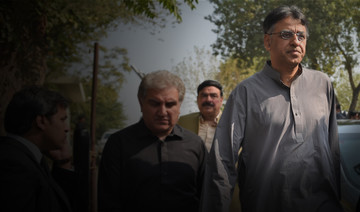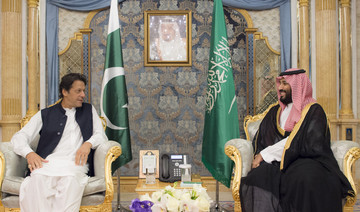ISLAMABAD: Expressing solidarity with the Kingdom of Saudi Arabia, Pakistan on Saturday once again reiterated its commitment to defend the sovereignty of the country, Muhammad Ateeq Shaikh, a member of the Senate told Arab News.
The comments followed a meeting conducted by the Senate standing committee on foreign affairs on Friday to review the situation in the Gulf and the role that Pakistan is expected to play in it.
Senator Shaikh said that Foreign Ministry Spokesman, Dr. Mohammad Faisal briefed the committee on the situation in the Gulf region, adding that there would be no change in Islamabad’s policy toward the Kingdom.
“We all (the members of the committee) unanimously expressed solidarity with Saudi Arabia,” Shaikh, a representative of the Mutahidda Qaumi Movement (MQM) said. MQM is an ally of the ruling Pakistan Tehreek-e-Insaf (PTI) party.
Ties between Islamabad and Riyadh are deep-rooted and Pakistan has always been vocal about its support for the Kingdom, insisting that it will always work toward protecting its sovereignty as a matter of principle and based on the historic ties shared between the two countries.
Saudi Arabia was the first country that Prime Minister Imran Khan chose to visit since assuming office in August this year. He returned to the Kingdom once again in October to participate in a prestigious business conference in Riyadh, also known as the “Davos in the desert”.
Earlier this week, Saudi Arabia’s ambassador to Pakistan, Nawaf bin Saeed Al-Maliki, met with President Dr. Arif Alvi at the President House in Islamabad.
A statement issued after the meeting said that the two countries would soon sign an agreement to establish an oil refinery in Pakistan, in addition to finalizing other major projects which Saudi Arabia has shown interest in.
Dr. Alvi, on his part, stressed on the need for more exchanges to take place between the business delegations of both the countries.
Pakistan reiterates its promise to protect Kingdom’s sovereignty
Pakistan reiterates its promise to protect Kingdom’s sovereignty
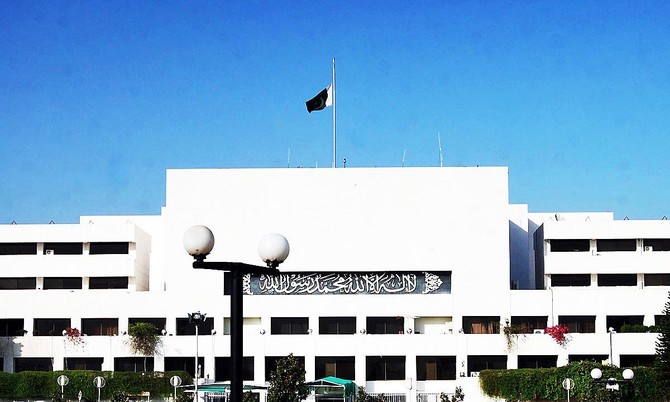
- Senate apprised of ongoing situation in the Gulf region
- PM Khan cements ties with ally by visiting country twice since assuming office in August
Six-day ‘Study in Dubai’ fair highlights UAE’s growing appeal to Pakistani students
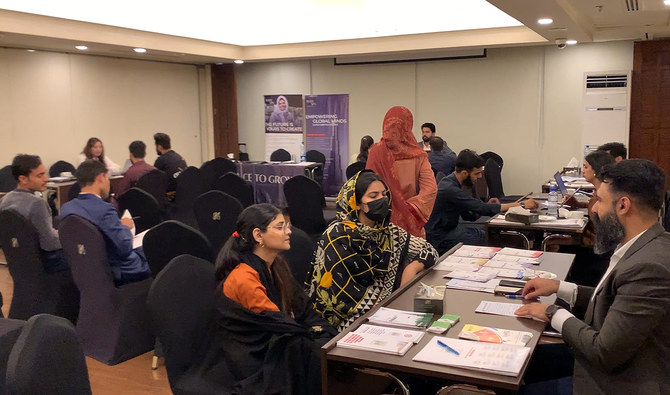
- Foreign student enrollment has increased in Dubai since the launch of its education policy over six years ago
- Educational professionals say Dubai is competing with traditional destinations like the US, UK and Australia
ISLAMABAD: The United Arab Emirates (UAE) has gained traction as a major higher education destination for Pakistani students, university representatives and local admissions professionals noted this week, as the six-day “Study in Dubai” fair concluded in Lahore on Saturday after touring various cities.
Dubai has seen a significant increase in foreign student enrollments since the launch of the UAE National Strategy for Higher Education 2030 more than six years ago. UAE authorities reported this month international enrollments have risen by 25 percent since the 2022-23 academic year, including a seven percent increase among Pakistani students.
Education professionals believe Dubai is increasingly competing with traditional education destinations such as the United States, United Kingdom and Australia.
“What we have observed is that Pakistani students have started moving toward the Emirates,” Muhammad Shoaib told Arab News on Tuesday when the education fair was held in Rawalpindi.
“This is particularly because there have been some policy changes in the mainstream destinations, like Canada, Australia and the UK,” he continued. “Furthermore, we have seen that many reputable universities from the US, UK and Australia have started opening their campuses in Dubai.”
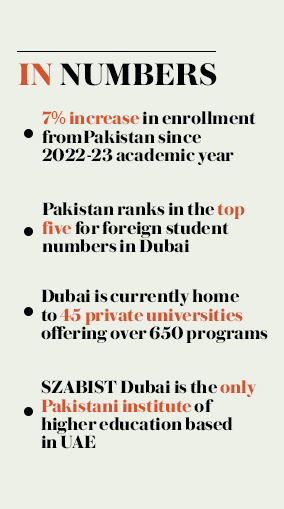
Dubai is currently home to 45 private universities offering over 650 programs, with degrees in business, engineering, information technology and media being the most sought-after among students.
Several top-ranking institutions of learning, including New York University, University of Birmingham, and Australia’s Curtin University, have opened their campuses there in recent years.
Wali-Ur-Rehman, the country manager for Curtin University’s Dubai campus in Pakistan, said the growth in international enrollment was due to increased postgraduate funding and greater job opportunities for those pursuing higher education in Dubai.
“We have seen a massive growth, from 2023 to 2024, of 40 percent [in terms of student applications] in the [Dubai] market, coming from Pakistan especially,” he said.
Daniyal Ahmed, a 19-year-old aspiring candidate for study in Dubai, described the UAE as an “ideal option” for him due to its proximity to Pakistan.
“Dubai has well-known universities now, like New York University and Khalifa University, which are performing quite well,” he said.
Asked about the traditional destinations preferred by students pursuing higher education, he said Pakistanis were beginning to face difficulties in securing visas to go to European universities.
Ahmed also mentioned Dubai’s education strategy, saying it included an expanded professional experience initiative, providing a variety of career training programs to students, such as on-campus work, job shadowing, joint ventures and vocational training.
Pakistan’s PM Sharif to kick off World Economic Forum engagements in Riyadh today
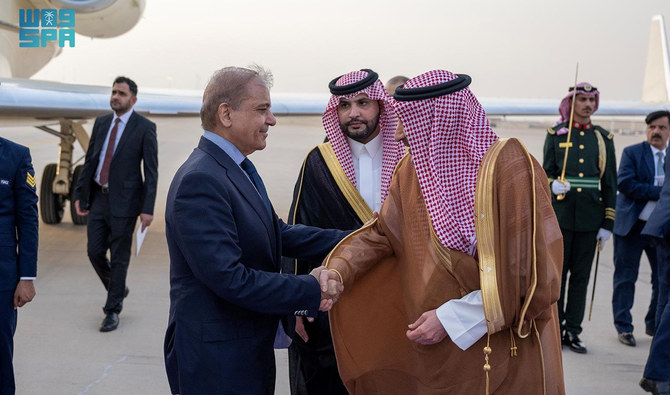
- PM Shehbaz Sharif is in Riyadh to attend two-day World Economic Forum meeting on global growth and energy
- Sharif to meet Saudi leadership, world leaders and heads of international organizations during conference
ISLAMABAD: Prime Minister Shehbaz Sharif and his delegation will kick off their World Economic Forum engagements in Riyadh today, Sunday, as they gear up to present Pakistan’s priorities on key issues such as global health, energy and economic growth, his office said.
Sharif arrived in Riyadh on Saturday to attend a two-day WEF meeting on global collaboration, growth and energy, which will be held in the Saudi capital from April 28-29.
The prime minister was extended an invitation to attend the meeting by Crown Prince Mohammed bin Salman and Professor Klaus Schwab, the WEF executive chairman.
“PM Shehbaz Sharif and his delegation will present Pakistan’s priorities in global health, fintech, climate change, inclusive energy and rejuvenating growth,” the Prime Minister’s Office (PMO) said in a statement on social media platform X.
It added Sharif would meet the Saudi leadership, world leaders, heads of international organizations and prominent figures during his stay in the country.
“Look forward to important discussions on pressing challenges of our times,” the Pakistani prime minister posted from his X account separately on Sunday.
Prior to Sharif’s departure, the PM Office said he would be accompanied by Foreign Minister Ishaq Dar and Finance Minister Muhammad Aurangzeb.
It said Sharif’s participation in the forum will afford Pakistan an opportunity to highlight its priorities in global health architecture, inclusive growth, revitalizing regional collaboration, and the need for striking a balance between promoting growth and energy consumption.
The prime minister will also attend the 15th session of the Islamic Summit Conference organized by the Organization of Islamic Cooperation (OIC) on May 4-5 in the Gambian capital of Banjul to discuss a variety of regional and global issues, including Palestine, Islamophobia, climate change and the status of minorities, the Pakistani state-run APP news agency reported.
The session will be held under the slogan “Enhancing Unity and Solidarity through Dialogue for Sustainable Development,” according to a press release issued by the OIC General Secretariat.
The Islamic Summit is a principal organ of the OIC focused on the formulation, development, and implementation of decisions made by 57 member states. It is attended by concerned heads of state such as prime ministers, presidents, emirs and other equivalent heads.
Security forces kill one militant, injure another in Pakistan’s southwestern Balochistan
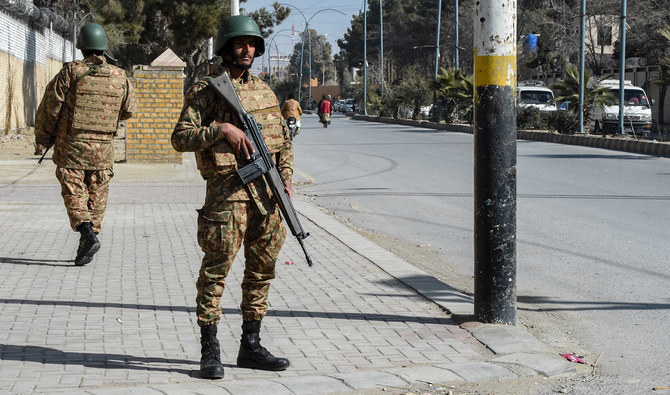
- The operation was carried out while militants were trying to stop passenger vehicles in Harnai district
- Baloch militants killed nine migrant laborers from Punjab in March after stopping a bus in Noshki
ISLAMABAD: Security forces in Pakistan killed one militant and injured another in the country’s southwestern Balochistan province, said the military’s media wing, ISPR, on Saturday, while they were trying to stop passenger vehicles in Harnai district.
Earlier this month, armed assailants intercepted a bus traveling from Quetta to Taftan near the city of Noshki, singling out nine passengers, who were later identified as migrant laborers from Punjab province, and shot them.
Balochistan’s Harnai district has also witnessed militant violence, with an improvised explosive device killing one employee of Mari Petroleum and injuring 14 others in March 30.
“On 27 April 24, a fire exchange took place between security forces and terrorists in Harnai District of Balochistan,” the ISPR said. “The terrorists tried to stop passenger vehicles plying on Sanjavi Road, Harnai. Security Forces reacted immediately and effectively engaged the terrorists.”
The statement mentioned that one militant was killed and another injured during the fire exchange.
“The timely response by the security forces thwarted nefarious intent of the terrorists, saving innocent lives,” the statement added. “Sanitization operation is being carried out to eliminate any terrorists found in the area.”
Balochistan has long been the scene of a low-level insurgency by separatist groups who accuse the state of denying the people of the province of their share in its vast mineral wealth.
The government has frequently denied the allegation, saying it is carrying out a number of development projects for the prosperity of Baloch nationals.
Pakistan says net-metering promotes ‘unhealthy investments’ in solar power
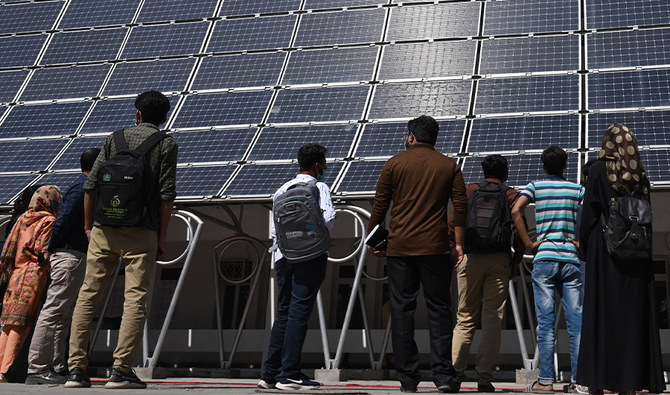
- Government says massive solar installation is affecting 30 million consumers, imposing Rs1.90 per unit burden on them
- Experts say the government’s ‘regressive policies’ will make it difficult to cut fossil fuel and promote renewable energy
ISLAMABAD: The Pakistan government said on Saturday net-metering was promoting unhealthy investments in installation of solar power by affluent domestic and industrial consumers, hinting at cutting the buyback rates to discourage uptick in the sector.
The government approved the net-metering policy in 2017, allowing solar panel purchasers to sell power they produced to the national grid to spur the solar energy use and cut power shortages. Under the policy, the government is paying Rs21 per unit for the net-metered electricity which the government says is resulting in the subsidy of Rs1.90 per unit, burdening the government.
This development comes at a time when the price of solar panels has plummeted by more than 60 percent in Pakistan in recent weeks due to the bulk imports from China because of lower rates, making the country witness a surge in the solar power installation by domestic and industrial consumers to reduce their electricity bills.
“The present system of net-metering is promoting unhealthy investments in solar power,” the energy ministry said in a statement on Saturday. “Affluent consumers have been massively installing solar power due to which domestic, industrial consumers and the government have to bear the burden of Rs 1.90 per unit under the head of subsidy.”
The ministry warned the subsidy was affecting some 25 to 30 million “poor consumers,” and if the trend of the solar power continued, the bills of ordinary consumers would surge by at least Rs 3.35 per unit. However, it clarified no fixed tax was being imposed on the solar power.
The 2017 net-metering policy was aimed at promoting renewable energy in the system, which helped enhance the solarization in the country that now “needs to be balanced,” the ministry said.
Pakistan has ideal climatic conditions for solar power generation, with over nine hours of sunlight in most parts of the country. Utilizing just 0.071 percent of the country’s area for solar photovoltaic (solar PV) power generation would meet Pakistan’s electricity demand, according to the World Bank.
Currently, only 5.4 percent of Pakistan’s installed power generation capacity of 39,772 megawatts comes from renewables like wind, solar and biomass, while fossil fuels still make up 63 percent of the fuel mix, followed by hydropower at 25 percent, according to the National Electric Power Regulatory Authority (NEPRA).
The South Asian nation of 241 million aims to shift to 60 percent renewable energy by 2030 with 50 percent reduction in projected emissions, but it stands far behind in meeting the goal despite a recent surge in the solar power.
Energy experts said the government’s “inconsistent” solar power policies would result in discouraging the sector and its failure in meeting the national and international commitments of cutting the greenhouse gas emissions.
“Public sector the world over is promoting renewable energy to cut fossil fuel while we are discouraging consumers with regressive policies,” Aamir Hussain, chairman of Pakistan Alternative Energy Association, told Arab News.
He said the association had suggested the government to issue licenses to consumers for their actual household or industry load instead of allowing them to install massive solar power with a promise to buyback the surplus.
“The government should come up with an inclusive policy to promote renewable energy instead of discouraging consumers by slapping taxes or cutting the rates,” he added.
Babar Azam and Shaheen Afridi help Pakistan down New Zealand to draw T20I series

- Azam’s 44-ball 69 took Pakistan to 178-5, while Afridi’s 4-30 restricted New Zealand to 169 in 19.2 overs
- The series gave both the teams a kickstart to their preparations for the T20 World Cup in June this year
LAHORE: Skipper Babar Azam hit a solid half century while spearhead Shaheen Shah Afridi grabbed four wickets as Pakistan overcame New Zealand by nine runs in the fifth and final Twenty20 international in Lahore on Saturday.
Azam’s 44-ball 69 and Fakhar Zaman’s 33-ball 43 took Pakistan to 178-5 in their 20 overs before Shaheen claimed 4-30 to restrict New Zealand to 169 in 19.2 overs, squaring the series at 2-2.
But Pakistan’s win only came in the final over with 12 needed as Josh Clarkson 38 not out threatened to pull off a heist, but two run outs in Mohammad Amir’s over sealed the home win much to the delight of a full house at Qaddafi Stadium.
The first match of the series was abandoned while Pakistan clinched the second and New Zealand the third by identical seven-wicket margins – all in Rawalpindi.
New Zealand took the fourth match, also in Lahore, by four runs.
The series gave both the teams a kickstart to their preparations for the Twenty20 World Cup to be held in the United States and the West Indies in June.
While Pakistan would be disappointed not to have won a series against a depleted New Zealand side missing a host of players due to Indian Premier League, unavailability and injuries, the visitors got a boost from their bench strength.

Shaheen gave Pakistan an ideal start by dismissing Tom Blundell for four in his first over – his 15th wicket in his opening over of a Twenty20 international – and 50th in all T20 matches.
Tim Seifert put New Zealand back on track with an aggressive 33-ball 52 – his ninth T20I half century containing seven boundaries and two sixes.
He added 76 for the second wicket with skipper Micheal Bracewell (23) but from 81-1 New Zealand lost four wickets in the space of 25 balls for the addition of just 22 runs.
Leg-spinner Usama Mir (2-21) had Seifert and Mark Chapman (12) while fellow spinner Shadab Khan accounted for Bracewell as New Zealand’s chase was derailed.
Shaheen returned for a second spell to dismiss James Neesham (16), Zak Foulkes (naught) and Ish Sodhi (three) in successive overs.
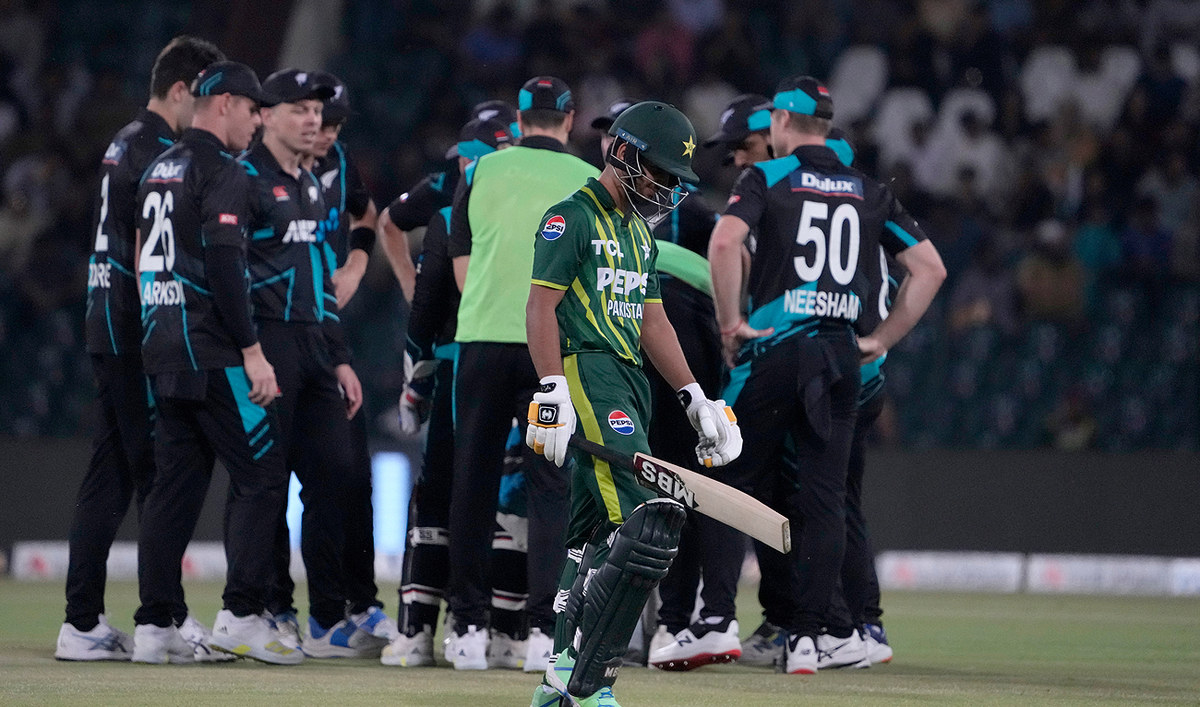
Earlier, Azam saw his opening partner Saim Ayub fall in the second over for just one but that did not deter him as he added 73 for the second wicket with Usman Khan who made a brisk 24-ball 31.
Azam hit six boundaries and two sixes in his 34th T20I half-century before he was bowled by pacer Ben Sears in the 15th over.
Zaman hit four boundaries and a six before he was smartly caught by Chapman on the boundary off Foulkes as Pakistan managed 55 in the last five overs.
Shadab Khan hit a six and a four in his five-ball 15 not out.
New Zealand made three changes as they brought back Seifert, Cole McConchie and Foulkes while pace spearhead Shaheen returned for the home team.


